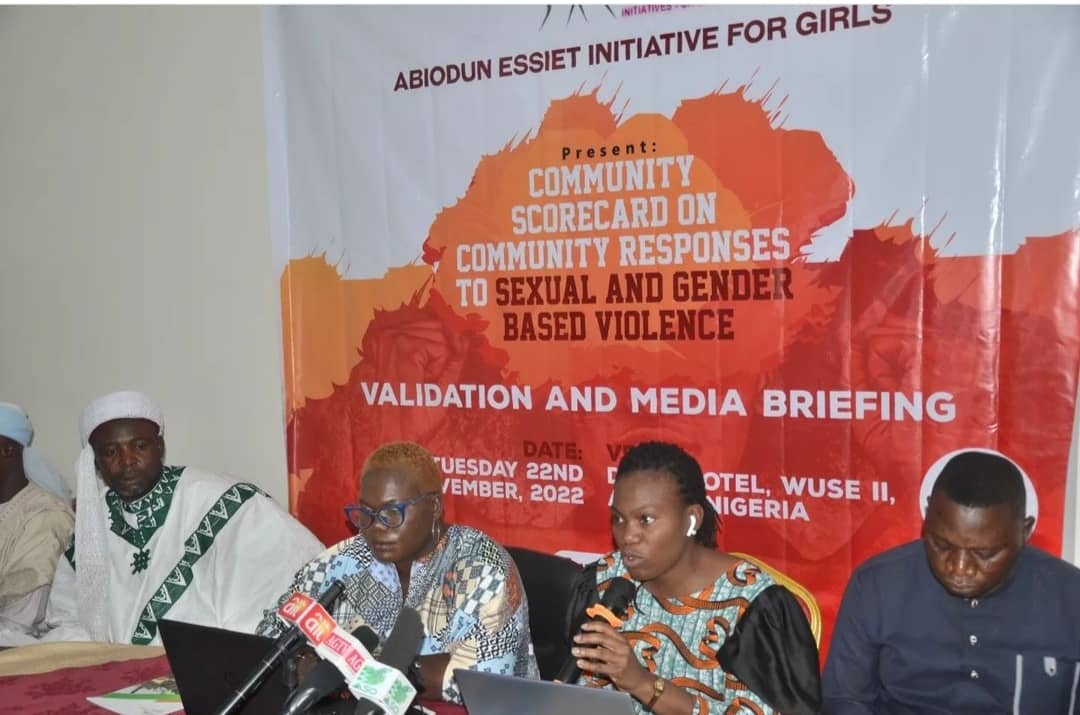
The Abiodun Essiet Initiative for Girls (AEIG), an NGO, has called for improved synergy among institutions that respond to sexual and gender-based violence (SGBV) in the Federal Capital Territory.
Mrs Abiodun Essiet, Executive Director, AEIG said this on Tuesday in Abuja, while briefing newsmen on the “Community Scorecard on Community Response to Sexual and Gender-Based Violence Validation”.
She said that it was important to encourage synergy among these institutions both at the local and state level to ensure effective response to cases of SGBV.
According to her, the organisation was following the United Nations Women call for grassroots initiatives to work with traditional leaders, instead of working against them in a bid to beat SGBV.
She added that there was need to also strengthen the capacity of traditional rulers in promoting the social justice system and addressing SGBV cases.
Essiet added that on its part, the NGO embarked on a baseline study and developed community scorecards to understand the peculiarities faced by different communities as they handled SGBV cases.
“A Community Score Card is a two-way and an ongoing participatory tool for assessment, planning, monitoring and evaluation of services.
“It brings together the demand side that is, service user, and the supply side, that is, service provider, of a particular service or program to jointly analyse issues underlying service delivery problems and find a common and shared way of addressing those issues.
“For this scorecard, the traditional rulers or council of chiefs are seen as the service providers while the community members are seen as the service users.
“The community scorecard was an eye opening, interesting and shocking experience, most of the traditional leaders that were interviewed saw some forms of violence as norms.
“In case of incest for example, in some communities, they see it as a taboo and a reason to pray and appease the gods to cleanse the land, they punish the offender if the case is brought to them and that is where it ends. Cases are not taken to the police.
“In an attempt to probe further, they claim it does not happen in their communities but if it does, it is not been reported to them.
“Community members and the traditional leaders alike needs thorough sensitization of all forms of violence and the right ways they are to be handled.
“Traditional leaders need thorough training; disabusing their minds of norms and culture that tolerates SGBV, as well as, furnishing them with the legal ways of handling SGBV, referral system, record keeping and sensitization,” she said.
Essiet while giving an update on the Awyetu Sexual Assault Referral Centre in Bwari Area Council, added that there was need for an urgent approach of running the center.
“A more sustainable way of running the center in order to guarantee continuity of services and availability of commodities and drugs should be explored.
“There should also be permanent staff posted to the center so that they can deepen community sensitization and engagement and promote uptake of their services; leveraging on community referral.
“There is need to encourage synergy amongst institutions responding to SGBV at the local and state level to ensure effective response to cases of SGBV.
“The SARC hotline phone should be made functional as so much work needs to be done, the action plan raised in each community is a way to start,” she said.(NAN)